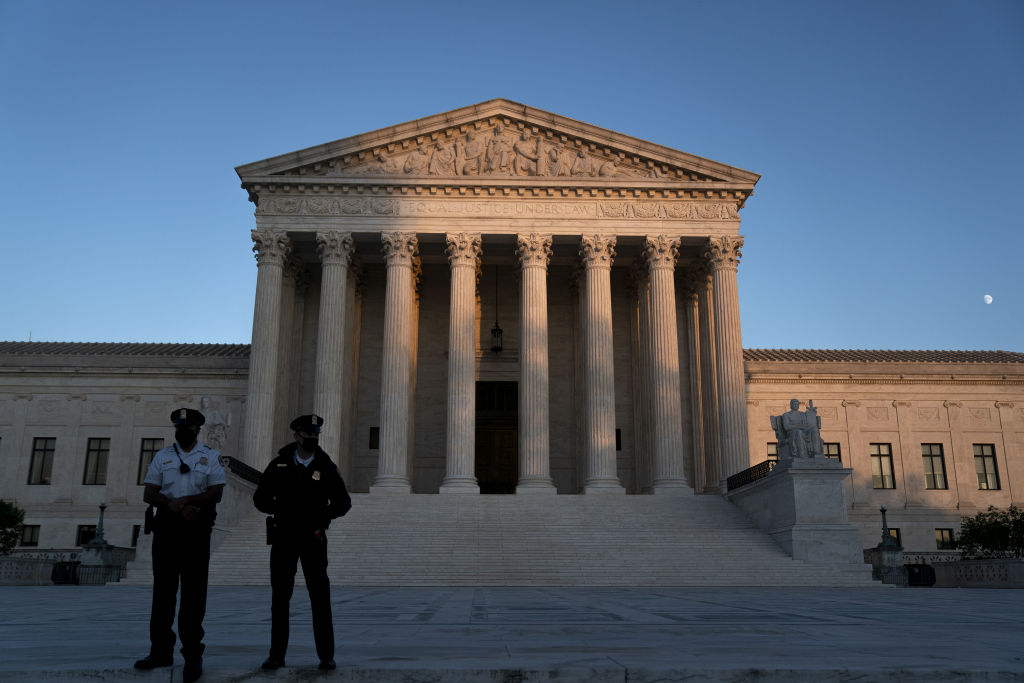
The Supreme Court on Wednesday handed Democrats major victories in election legal battles in two critical swing states, letting extended deadlines for mail-in ballots in North Carolina and Pennsylvania remain in place for now.
The Supreme Court declined to expedite a decision on Pennsylvania’s extended deadline for receiving mail-in ballots, virtually guaranteeing it will remain in place through the election, and, in a separate ruling, declined to halt an appeals court ruling that kept the North Carolina deadline in place.
Justices Samuel Alito, Neil Gorsuch and Clarence Thomas dissented in both of the rulings. The Court’s newest justice, Amy Coney Barrett, who was confirmed on Monday, did not participate because she did not have adequate time to review the filings, according to the court’s public information officer.
As a result of the rulings, mail-in ballots postmarked by Election Day can be received through Nov. 6th in Pennsylvania and Nov. 12 in North Carolina, instead of being cut off on Nov. 3. Thousands more ballots are likely to be counted as a result.
The battle over the North Carolina deadline stemmed from a settlement agreement between the North Carolina Alliance for Retired Americans and the North Carolina Board of Elections. The group had sued the Board of Elections to ease mail-in voting restrictions, and part of the agreement included extending the ballot receipt deadline to Nov. 12.
Republicans, including the Trump campaign, challenged that in court, and subsequently appealed to the Supreme Court. Democratic lawyer Marc Elias, who had fought for the extended deadline, called the Supreme Court decision “a victory for voting rights.”
The fate of the Pennsylvania ballots, however, may still be uncertain. Justice Samuel Alito wrote in a statement that while the court would not expedite the decision before Nov. 3, “additional opinions may follow,” and left open the possibility of the court taking up the case at a later date.
In September, Pennsylvania’s State Supreme Court issued a ruling extending the deadline for receiving mail-in ballots to Nov. 6. The state’s Republican Party has already tried to appeal the decision to the Supreme Court once before. The first time, the court deadlocked in a 4-4 tie, leaving the state court’s ruling in place. Days later the party appealed the case, requesting the court expedite the decision, perhaps hoping that Justice Amy Coney Barrett’s upcoming confirmation would change the outcome.
The sagas surrounding both of these states’ mail-in ballot provisions has been among the most-watched legal battles of this election cycle, in no small part because they are both critical in determining who wins the presidency. Voting is already underway in both of these states. Millions of ballots have been mailed to voters, and in Pennsylvania the final receipt deadline was already listed as Nov. 6.
State officials argued that changing the rules at this late date would disenfranchise voters.”The election is now only eight days away,” Pennsylvania Attorney General Josh Shapiro wrote in a filing to the court urging them not to expedite the case. “Time has run out.”
Alito argued in his statement that there was a “strong likelihood” the Pennsylvania court’s decision violated the federal constitution, but there was simply no time left before the election for the court to take up the case.
Several hours before the court issued the decision, Shapiro’s office submitted a filing to the court stating that Pennsylvania Secretary of State Kathy Boockvar had told the election boards to segregate all ballots received from 8 pm on Nov. 3 through 5 pm on Nov. 6. Alito said segregating those ballots is critical to providing a “targeted remedy” in the event the state court’s decision is ultimately overturned.
Shapiro said in a statement after the court’s decision on Wednesday denying expedited review was “good for Pennsylvania voters, who will not have the rules changed on them on the eve of the election without proper review.” But, he cautioned, “we know this fight may not be over and we are prepared.”
Even though the decision means the Nov. 6 cutoff for Pennsylvania will almost certainly remain in place, the Trump campaign claimed the state’s willingness to segregate the ballots as a victory and predicted the fight would continue.
“The Supreme Court deferred the important issue in this case—whether state courts can change the times, places, and manners of elections contrary to the rules adopted by the state legislature—until after November 3,” Trump campaign deputy campaign manager and senior counsel Justin Clark said in a statement.
These rulings came two after the Justices ruled 5-3 to uphold the election-day receipt deadline for mail-in ballots in Wisconsin, which was a blow for Democrats.
More Must-Reads from TIME
- Donald Trump Is TIME's 2024 Person of the Year
- Why We Chose Trump as Person of the Year
- Is Intermittent Fasting Good or Bad for You?
- The 100 Must-Read Books of 2024
- The 20 Best Christmas TV Episodes
- Column: If Optimism Feels Ridiculous Now, Try Hope
- The Future of Climate Action Is Trade Policy
- Merle Bombardieri Is Helping People Make the Baby Decision
Write to Alana Abramson at Alana.Abramson@time.com
